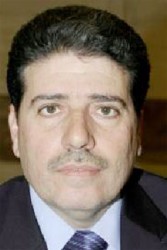BEIRUT (Reuters) – Syria’s prime minister survived a bomb attack on his convoy in Damascus yesterday, as rebels struck in the heart of President Bashar al-Assad’s capital.
Six people were killed in the blast, the British-based Syrian Observatory for Human Rights said. Previous rebel attacks on government targets included a December bombing which wounded Assad’s interior minister.
UN Secretary-General Ban Ki-moon condemned the bombing, which he described as a “terrorist attack.”
As prime minister, Wael al-Halqi wields little power but the attack highlighted the rebels’ growing ability to target symbols of Assad’s authority in a civil war that, according to the UN, has cost more than 70,000 lives.
Assad picked al-Halqi in August to replace Riyadh Hijab, who defected and escaped to neighbouring Jordan just weeks after a bombing killed four of the president’s top security advisers.

Yesterday’s blast shook the Mezze district soon after 9 am (2 am EDT), sending thick black smoke into the sky. The Observatory said one man accompanying al-Halqi was killed as well as five passers-by.
State television showed firemen hosing down the charred and mangled remains of a car. Close by was a large white bus, its windows blown out and its seats gutted by fire. Glass and debris were scattered across several lanes of a main road.
“Dr Wael al-Halqi is well and not hurt at all,” state television said.
It later broadcast footage of al-Halqi, who appeared composed and unruffled, chairing what it said was an economic committee.
In comments released by the state news agency SANA but not shown on television, al-Halqi was quoted as condemning the attack as a sign of “bankruptcy and failure of the terrorist groups”, a reference to the rebels battling to overthrow Assad.
Mezze is part of a shrinking “Square of Security” in central Damascus, where many government and military institutions are based and where senior officials live.
Sheltered for nearly two years from the destruction ravaging much of the rest of Syria, it has been sucked into violence as rebel forces based to the east of the capital launch mortar attacks and carry out bombings in the center.
Assad has lost control of large areas of northern and eastern Syria, faces a growing challenge in the southern province of Deraa, and is battling rebels in many cities.
But his forces have been waging powerful ground offensives, backed by artillery and air strikes, against rebel-held territory around the capital and near the central city of Homs which links Damascus to the heartland of Assad’s minority Alawite sect in the mountains overlooking the Mediterranean.





